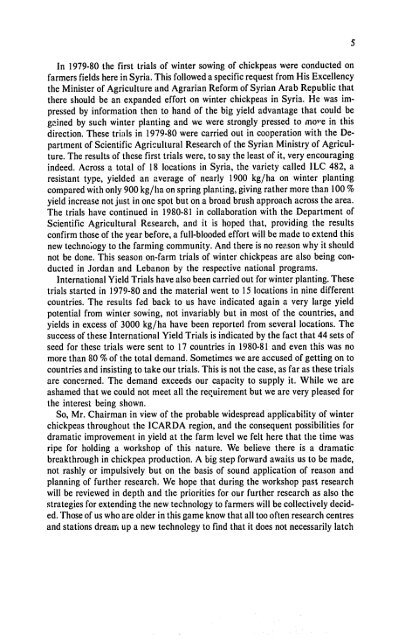I - --ii
I - --ii
I - --ii
You also want an ePaper? Increase the reach of your titles
YUMPU automatically turns print PDFs into web optimized ePapers that Google loves.
In 1979-80 the first trials of winter sowing of chickpeas were conducted on<br />
farmers fields here in Syria. This followed a specific request from His Excellency<br />
the Minister of Agriculture and Agrarian Reform of Syrian Arab Republic that<br />
there should be an expanded effort on winter chickpeas in Syria. He was impressed<br />
by information then to hand of the big yield advantage that could be<br />
gained by such winter planting and we were strongly pressed to move in this<br />
direction. These trials in 1979-80 were carried out in cooperation with the Department<br />
of Scientific Agricultural Research of the Syrian Ministry of Agriculture.<br />
The results of these first trials were, to say the least of it, very encouraging<br />
indeed. Across a total of 18 locations in Syria, the variety called ILC 482, a<br />
resistant type, yielded an average of nearly 1900 kg/ha on winter planting<br />
compared with only 900 kg/ha on spring planting, giving rather more than 100 %<br />
yield increase not just in one spot but on a broad brush approach across the area.<br />
The trials have continued in 1980-81 in collaboration with the Department of<br />
Scientific Agricultural Research, and it is hoped that, providing the results<br />
confirm those of the year before, a full-blooded effort will be made to extend this<br />
new technoiogy to the farming community. And there is no reason why it should<br />
not be done. This season on-farm trials of winter chickpeas are also being conducted<br />
in Jordan and Lebanon by the respective national programs.<br />
International Yield Trials have also been carried out for winter planting. These<br />
trials started in 1979-80 and the material went to 15 locations in nine different<br />
countries. The results fed back to us have indicated again a very large yield<br />
potential from winter sowing, not invariably but in most of the countries, and<br />
yields in excess of 3000 kg/ha have been reported from several locations. The<br />
success of these International Yield Trials isindicated by the fact that 44 sets of<br />
seed for these trials were sent to 17 countries in 1980-81 and even this was no<br />
more than 80 %of the total demand. Sometimes we are accused of getting on to<br />
countries and insisting to take our trials. This is not the case, as far as these trials<br />
are concerned. The demand exceeds our capacity to supply it. While we are<br />
ashamed that we could not meet all the requirement but we are very pleased for<br />
the interest being shown.<br />
So, Mr. Chairman in view of the probable widespread applicability of winter<br />
chickpeas throughout the ICARDA region, and the consequent possibilities for<br />
dramatic improvement in yield at the farm level we felt here that the time was<br />
ripe for holding a workshop of this nature. We believe there is a dramatic<br />
breakthrough in chickpea production. A big step forward awaits us to be made,<br />
not rashly or impulsively but on the basis of sound application of reason and<br />
planning of further research. We hope that during the workshop past research<br />
will be reviewed in depth and the priorities for our further research as also the<br />
strategies for extending the new technology to farmers will be collectively decided.<br />
Those of us who are older in this game know that all too often research centres<br />
and stations dream up a new technology to find that it does not necessarily latch<br />
5

















